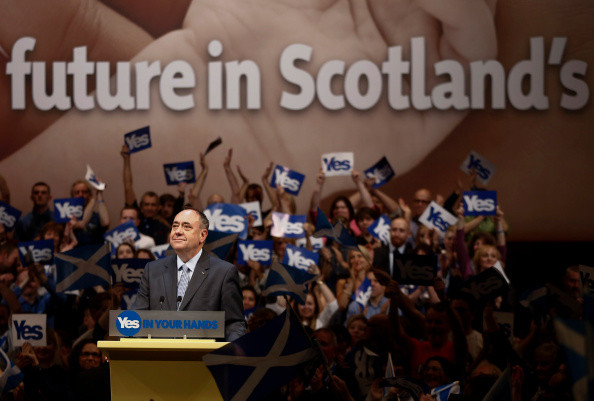Scotland Independence Referendum: This is It - and We Mustn't Get Cold Feet Now

"Well," as Alistair Darling has such an irritating habit of saying, "this is it." Throughout my entire adult life, I have craved to see Scotland become a normal independent country, because I believe that it will lead to a more equal society, to a transformative improvement in our democratic processes, and to the removal of inhuman weapons of mass destruction from our soil. It's scarcely comprehensible that just one day, this day, will determine whether all of that happens, or whether Scotland's cause is put on the back-burner again for perhaps another twenty or thirty years.
It's only when you ponder the "little" things that you truly appreciate just how big this is. Will the House of Lords be abolished in Scotland? On the ballot today. Will the God-awful first-past-the-post voting system be consigned to the dustbin of history? On the ballot today. Will Andy Murray, who has apparently just come out for a Yes vote (assuming his Twitter account hasn't been hacked!), ever represent Scotland at the Olympics? On the ballot today.
And yet weirdly I feel quite calm. I think maybe there's a tendency at great historical turning-points to subconsciously feel that the outcome is determined by powerful forces beyond our control, and that we are mere spectators. That categorically isn't the case, of course. If the contest is as close as the opinion polls suggest, then the result really will be determined by countless little decisions that individuals make today – not least the decisions of Yes supporters to give up their time to knock on doors and help get the pro-independence vote out.
So what will Scotland feel like tomorrow? Contrary to the perception of some of our detractors, I don't know a single supporter of independence who would react to a Yes vote by thinking "job done" and then do nothing but grin inanely for the rest of their natural life. Most of us see self-government as an essential prerequisite to achieving important objectives, but no more than that – actually getting to the destination will require a huge amount of work well beyond independence day. The vast expansion of childcare provision that has been at the heart of the Yes campaign's pitch won't just happen by magic, nor will all the nuclear weapons disappear by teatime on Saturday. But if we vote Yes, we take the success of these plans into our own hands. By voting No, we guarantee failure.
Traumatic
I don't know a single supporter of independence who would react to a Yes vote by thinking "job done" and then do nothing but grin inanely for the rest of their natural life.
I'm not sure No voters yet appreciate just how traumatic an experience it would be for Scotland to wake up tomorrow, look at itself in the mirror, and realise that the one and only thing it did when it took power into its own hands for a day was to throw that power away again, possibly forever. Few people would escape that hangover, no matter how they voted. We need look no further than the Quebec experience for the proof of that – people quickly realised they'd been conned into voting No by promises of more autonomy that never materialised, and yet there was nowhere left to go. There was no option, and no apparent will, to go back in time and take the power back.
Indeed, our trauma may be even worse than Quebec's, because our own No campaign's message has degenerated from "vote No for a few extra powers that we may or may not deliver" to "vote No because thinking is too hard". Last night, my jaw dropped to the floor when I received a leaflet that literally read "if you don't know, vote No". I struggle to imagine how our collective self-esteem would ever recover from the knowledge that we had thrown away our golden opportunity for such a braindead "reason".
My own message to undecided voters is this: if you still don't know, take just two hours on the internet to find as much information as you can (the brilliant Wee Blue Book is a good place to start), and then vote either Yes or No. We'll all do our best to make things work afterwards, even though a No would set Scotland on a very tough road. But don't rush blindly into the biggest hangover in history just because siren voices from London are telling you that two hours of thinking will probably feel too much like hard work.
© Copyright IBTimes 2024. All rights reserved.







